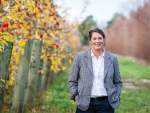Vegetable growers will be taking a hit from lost production this year because of the wet weather, says Horticulture NZ’s chief executive Mike Chapman.
“It is catch-up mode and in terms of the normal supply that would be around this time of year, growers will be losing a lot of money; they just can’t supply the quantities going forward,” he told Rural News.
Rain is not the whole problem, he says. Warmer weather is also needed so the plants can grow.
“Since March we’ve basically had rain, and across the regions, with a few minor exceptions, it has just made working in vegetable gardens very difficult.
“The soil is heavy and it is very hard to get tractors in and out; it’s cold and wet and plants don’t grow in that cold and wet.
“About a month ago hailstorms came through Auckland, shredding leafy greens.
“So [some] plants haven’t been growing, and those that have been growing have been affected by constant downpours of rain and hail,” Chapman says.
“The things we are not seeing a lot of are, obviously, potatoes and also cauliflowers, lettuce, spinach, etc.”
The current weather difficulties have been across the board, although Southland has had a better spring.
Chapman says among the hardest hit areas is Pukekohe, which traditionally leads vegetable production at this time of the year and then the rest of the country follows.
“But in Horowhenua, for example, they can’t even turn the soil to plant. I was up there about a week ago and it was soul-destroying seeing crops shredded and destroyed by continual wet weather.”
While it is early days for fruit crops, they could also be put behind “depending on what nature delivers in the next few weeks”.
“Plants are struggling to grow – too cold, too wet,” he says.
“Who knows whether it is climate change or not, but we seem to be noticing the weather is a bit more unpredictable… El Nino or whatever pattern, I am just not sure.”



















